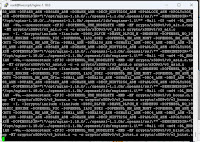ffmpeg -i rtmp://63b2dc7196c38.streamlock.net:1935/RIAUTV/myStream -i /var/www/html/hd.png -c:v libx264 -crf 18 -b:v 50000k -preset veryfast -pix_fmt yuv420p -filter_complex "overlay=(main_w-overlay_w)/2:(main_h-overlay_h)/2" -c:a copy -f flv rtmp://127.0.0.1:1955/pku/stream
ffmpeg -i rtmp://63b2dc7196c38.streamlock.net:1935/RIAUTV/myStream -loop 1 -i /var/www/html/images.png -c:v libx264 -crf 18 -b:v 50000k -preset veryfast -pix_fmt yuv420p -filter_complex "[0:v][1:v] overlay=110:10" -c:a copy -f flv rtmp://127.0.0.1:1955/pku/stream
ffmpeg -i rtmp://63b2dc7196c38.streamlock.net:1935/RIAUTV/myStream -loop 1 -i /var/www/html/hd.png -c:v libx264 -preset veryfast -pix_fmt yuv420p -filter_complex "[0:v][1:v] overlay=1500:810" -c:a copy -f flv rtmp://127.0.0.1:1955/pku/stream
ffmpeg -i rtmp://127.0.0.1:1935/rtvrohil/jtv.stream -loop 1 -i /var/www/html/hd.png -filter_complex "overlay=600:26" -c copy -b:v 2500k -b:a 128k -s 720x400 -ac 2 -vcodec libx264 -profile:v baseline -maxrate 1200000 -r 25 -f flv rtmp://127.0.0.1:1955:1955/rohiltv/stream
ffmpeg -i rtmp://127.0.0.1:1935/rtvrohil/jtv.stream -loop 1 -i /var/www/html/hd.png -filter_complex "overlay=600:26" -c copy -b:v 2500k -b:a 128k -ac 2 -vcodec libx264 -profile:v baseline -r 25 -f flv rtmp://127.0.0.1:1955:1955/rohiltv/stream


